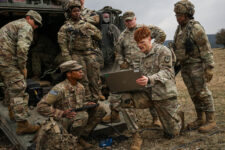
Iridium, which has 75 satellites in Low Earth Orbit for providing mobile satellite services, is likely to face interference from Ligado’s 5G wireless network, finds a new report. (Illustration: Iridium)
Updated 09/09/2022 at 1:31 pm ET to include comment by Ligado; and at 2:00 pm to include a DoD statement.
WASHINGTON — A congressionally mandated report by the National Academies of Sciences, Engineering, and Medicine finds that while “most” commercial GPS receivers will not be jammed by Ligado’s controversial 5G wireless network, Iridium’s mobile satellite services used by the Pentagon might experience “harmful interference.”
However, the report, released today, classifies any findings on the direct impact to Defense Department systems and missions, an unsatisfactory result for many of those looking for a solid, confirmed answer on whether Ligado’s network will harm DoD operations moving forward.
While stressing that no specific information was presented “as part of the committee’s public study,” the report does offer one clue that NAS may have found the situation for military systems to be less dire than DoD has asserted up to now. The report says that NAS “believes that it is reasonable to assume that DoD Authorized/Compliant Devices are expected to withstand willful interference under substantially higher power than is authorized” by the FCC.
The NAS was tasked by the 2021 National Defense Authorization Act to review the Federal Communications Commission’s 2020 order that allowed Ligado to use radio frequency bands generally reserved for satellite operations by its planned 5G terrestrial mobile phone network. The FCC’s decision piqued fierce backlash from the Defense Department and supporters in Congress, as well as other government agencies — with senior officials vociferously arguing that Ligado’s wireless cell towers would drown out signals from the Global Positioning System positioning, navigation and timing (PNT) satellites.
The 2021 NDAA gave NAS three tasks, according to the report:
- Assess which of two commonly used approaches to evaluating interference that might cause harm to GPS services would most effectively mitigate the risks of harmful interference to GPS services and U.S. Department of Defense (DoD) operations and activities.
- Assess the likelihood that the authorized Ligado service will create harmful
interference to GPS, MSS, and other commercial or DoD services and operations. - Assess the feasibility, practicality, and effectiveness of the measures in the FCC order to mitigate harmful interference effects on DoD devices, operations, and activities.
NAS found that Ligado’s network “will not cause most commercially produced general navigation, timing, cellular, or certified aviation GPS receivers to experience harmful interference,” according to the announcement accompanying the report’s release.
“However, some high-precision receivers, used for applications such as farming, geodesy, and surveying and sold before about 2012, can be vulnerable to significant harmful interference.” That said NAS also found that there are available technologies to update those receivers.
“[A]ll GPS receiver manufacturers could field new designs that could coexist with the authorized Ligado signals and achieve good performance even if their existing designs cannot,” the report concluded.
In addition, the NAS found, “certain” mobile satellite services provided by Iridium, and used by DoD, “will experience harmful interference under certain conditions.”
Specifically, the report explained, “Iridium terminals will experience harmful interference on their downlink caused by Ligado user terminals operating in the UL1 band while those Iridium terminals are within a significant range of a Ligado emitter — up to 732 meters.”
Iridium operates a satcom constellation in Low Earth Orbit that provides worldwide voice, data, and navigation services (including in the classified arena) to commercial as well as DoD and Intelligence Community customers. The company not only protested the Ligado decision in filings to the FCC, but also threatened to sue the agency if it did not reverse course.
As for the viability of mitigation solutions that the FCC required of Ligado, the NAS is, in general, skeptical about their actual feasibility and/or affordability. For devices approved by DoD and GPS receivers or systems using them in the US, replacing older, affected equipment may be a “plausible solution,” the report says.
“However, where such replacements are not immediately available this study concludes that this is not likely a satisfactory mitigation. These systems typically must pass very long and expensive operational test certification; generally, mitigations that include replacing or augmenting older devices would involve unsatisfactorily long delays,” the report says.
For example, Ligado opponents have argued that replacing older GPS units on high-end aircraft would require massive disassembly of the physical plane itself, which would be both costly for taxpayers and require taking capability off the flight line for an unknown amount of time.
For commercially produced devices, the report similarly finds it is a bit of a case-by-case question, and in many circumstances mitigation options may simply be impractical for “operationally relevant timescales or at reasonable cost.”
This finding seems to echo Transportation Department arguments, which is the government’s lead for civil GPS issues, that “millions” of non-DoD GPS users would be impacted, without any recourse but to pay handsomely to replace equipment — that might not even be immediately available.
But it is unclear — especially as the magnitude of the affects on DoD systems remains behind a veil of secrecy — whether the NAS findings will help DoT, DoD and the Commerce Department press their case for an FCC do-over.
While FCC Chair Jessica Rosenworcel has expressed some willingness to reconsider the matter, currently the commission is equally split between Republicans supporting the 2020 Ligado ruling and Democrats who might be more inclined to play nice with the current administration. (The FCC, it must be remembered, is an independent body and not subject to White House direction.)
Meanwhile, President Joe Biden’s nominee for the fifth commission seat , Gigi Sohn, has been stalled in the Senate for months due to Republican pushback on her net neutrality advocacy.
For its part, Ligado characterized the report as a victory.
“The NAS found what the nation’s experts at the FCC already determined: A small percentage of very old and poorly designed GPS devices may require upgrading. Ligado, in tandem with the FCC, established a program two years ago to upgrade or replace federal equipment, and we remain ready to help any agency that comes forward with outdated devices. So far, none have,” the company said in a press release.
It also took aim at DoD and the National Telecommunications and Information Administration efforts to overturn the FCC decision.
“Now that the review is completed, it is our sincere hope the DOD and the NTIA will stop blocking Ligado’s license authority and focus instead on working with Ligado to resolve potential impacts relating to all DOD systems, including but not limited to GPS,” the release noted.
By contrast, DoD argued that the NAS findings “confirm” its contentions that the Ligado network would “interfere with with DoD GPS receivers, which include high-precision GPS receivers” in a statement released today.
“The study also concludes that the [FCC] proposed mitigation and replacement measures are impractical, cost prohibitive, and possibly ineffective,” the DoD statement adds.
‘AI-BOM’ bombs: Army backs off, will demand less detailed data from AI vendors
Instead of demanding an exhaustive “AI Bill of Materials.” the Army will only ask contractors for a “baseball card” of key stats on their AI — while building up its in-house capacity to check for bad code or “poisoned” data.


























